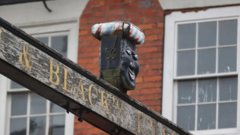
Matthew wanted to be the one to tell his mum he was gay. Not his classmates, his teachers, his neighbours, or his church. Him.
He had moved from South Africa to a town near Gloucester, England, with his family in 2001 when he was 10.
Matthew had known since he was young that he was gay, and school rumours meant he had little choice but to come out at 14.
‘The second I tell my mum, I could see there was a split,’ Matthew, now 32, tells Metro. ‘The first thing out of her mouth was, “as a mother, I’ve always known”, it was so caring and supportive.
‘But I could see in her eyes that this was going to be tough. Our church had told us all the time that it’s wrong to be gay.
‘This was going to be bigger than just me coming out and walking with it.’

Matthew’s mum, a ‘church every Sunday’ type, told the pastor about her son’s sexuality. ‘I sang for the worship team and I would see my mum crying with the pastor and the pastor’s wife,’ he recalls, ‘at a young age, I knew that it was because of me. I felt I had let my mum down.’
What Matthew was about to go through for the next five years has a name – conversion therapy, a discredited practice to change a person’s sexuality or gender identity.
Join Metro's LGBTQ+ community on WhatsApp
With thousands of members from all over the world, our vibrant LGBTQ+ WhatsApp channel is a hub for all the latest news and important issues that face the LGBTQ+ community.
Simply click on this link, select ‘Join Chat’ and you’re in! Don't forget to turn on notifications!
Some faith-based ‘treatments’ can start small, as they did with Matthew. Whispers between the pews. Looks and glances. ‘I’ll pray for you,’ they’d tell him.
Then came the meetings. The pastor, his wife, the youth leader and the youth leader’s wife grilled Matthew about his friendships, told him being gay is a ‘sin’ and ‘demonic’ and warned him not to befriend queer people.
‘If there are people in my life who are going to support my way of life or who are gay themselves,’ Matthew says, ‘then they’re bad as well.’

Church figures ‘broke up’ Matthew’s family by telling his mum he can’t be a part of her son’s life as much, he says. Matthew needs to spend more time with his dad and become more ‘masculine’ to ‘cure’ him.
‘I’m 16 years old at this point,’ Matthew says, ‘I barely know what any of this means.’
‘Faith is a massive part of people’s lives. I wanted to try and please them, it’s what I thought God wanted,’ he adds.
Matthew’s church then began sending the teen to ‘ex-gay’ pastors up and down the UK who were ‘professionals on how to get rid of the gay’.
‘They would be telling me they used to be gay but through the Holy Spirit, healing techniques and now having wives and children [no longer are gay],’ Matthew says. ‘They would be showing me these pictures, “this is what you want to have, what you need to have”.’
One Sunday, Matthew walked into church to be met by church leaders, youth leaders and his two ‘accountability partners’.

They had heard a rumour, the pastor told him, that Matthew had a crush on a male congregant. Not quite, Matthew says, he didn’t fancy any of the church’s 700 worshippers.
But that didn’t stop the pastor from sending all the congregants an email about Matthew’s sexuality and removing him from the worship team.
‘So I got up and I walked out of that meeting, and they were like, “we’ll see you next Sunday”. And I was like, “I don’t think you will”. I never told my mama that meeting happened,’ he says.
Conversion therapy treats gay men ‘like dogs’
Conversion therapy comes in many forms, sometimes involving extreme measures like institutionalisation, castration and electroshock therapy.
Faith-based methods – which can include ‘praying the gay away’, exorcisms and the so-called ‘ex-gay ministry’ – are among the most common forms of conversion therapy in the UK.
Quasi-psychoanalytic techniques, like one-on-one or group therapy sessions, are also common. Physical abuse and ‘corrective rape’ are, too, according to a survey by Stonewall released last month.
‘It’s a lot of nonsense,’ John-Pierre Joyce, author of Odd Men Out: Male Homosexuality in Britain from Wolfenden to Gay Liberation, tells Metro.

‘Voodoo witchcraft medicine,’ he says.
But from the 1940s to the 1970s – and still today – people believed it worked. Joyce rifled through medical records to understand Britain’s dark history with the practice for his book.
Before conversion therapy, there was ‘aversion therapy’, a ‘curative approach’ where patients were made to feel disgusted when looking at LGBTQ+ people/
At NHS and private clinics, patients would be given alcohol and injected with apomorphine, which mimics dopamine, to induce vomiting, all while being shown photos of naked men and listening to a psychologist over a loudspeaker telling them how ‘disgusting’ their behaviour is.
‘It’s about convincing them why it’s wrong or sinful, and then trying to condition them through psychological methods to become a “better, normal heterosexual person”,’ Joyce says.
‘The crude science behind it was like with animals or dogs, conditioning them to associate homosexuality with vomiting.’

‘Hundreds, if not thousands’ of people in Britain underwent the therapy. But the true number may be impossible to figure out, given that records have largely not been kept or destroyed.
Conversion therapy gained traction from the 1960s, bringing in ‘sophisticated’ methods while electrocuting gay men when shown a naked man, but not when a naked woman appears.
‘But there’s practically no evidence of this succeeding,’ Joyce says. ‘There were no changes, no long-term follow-up. If there was, the man hadn’t changed their behaviour or outlook at all.’
Matthew knows this all too well. He is, in fact, very much still gay. But that doesn’t mean conversion therapy didn’t impact him.
His mum left the church while he was in college over how they treated him, with the family moving to Cornwall. He came out to his dad when he was 24, having never told him what happened between him and the church.
‘When I tell you, we had to, we had to hold that man down. We thought he was about a march up to that church, but he was, he was about to march up to that church building, and he was about to start a fight,’ he says.

‘Conversion therapy is so damaging to an individual, their community, their family, and their friends. It rips people apart.’
Moving to Florida after 11 years performing on cruise ships, Matthew now works as a dance supervisor.
‘Every single day I walk into work, I feel I’m going to be called into a meeting with my bosses, they’re going to sit there in a panel and they’re going to tell me about something,’ he says. ‘I always feel like I’m doing something wrong.’
Even a coffee with his boss leaves him sweating and on the verge of a panic attack.
‘Conversion therapy has to stop’
Joyce worries that faith-based conversion therapy isn’t going away anytime soon. ‘The idea of trying to convert people is coming back with the growth of religious, fundamental movements,’ he says.

‘They’re trying to recondition people who just don’t fit in their view of the world, which is dangerous because it means there’s no control over it.
‘There’s no monitoring of it. Like [with Matthew], it sounds all very system under the radar, all very undercover and all very dangerous.’
Jayne Ozanne, the founder of the Ban Conversion Therapy coalition and a former member of the Church of England’s General Synod, its legislative body, knows one way to curb this.
Ban it.
‘Conversion therapy continues to ruin so many lives, placing crushing burdens of guilt, shame and self-hate on young LGBTQ+ people – often leaving them with no option but to consider taking their own lives,’ Ozanne tells Metro.
‘The tragedy is that some have then done so.’
Need support?
For emotional support, you can call the Samaritans 24-hour helpline on 116 123, email [email protected], visit a Samaritans branch in person or go to the Samaritans website.
Their HOPELINE247 is open every day of the year, 24 hours a day. You can call 0800 068 4141, text 88247 or email: [email protected].
Outlawing conversion therapy was first proposed by the Conservatives in 2018, only for consecutive governments to delay it.
‘We have still to see even draft legislation, causing us to doubt their resolve,’ Ozanne adds. ‘The longer they continue to delay, the more that perpetrators know they can continue to act with impunity.’
Matthew has spent his adult years trying to find the community he never had as a boy.
His faith, however, is something he never felt he was without.
‘I spent most of my teen years just by myself, being dismantled as a human being by this institution,’ Matthew recalls.
‘I still hold my faith very close to me because I know that it wasn’t God’s business. This was people.’
Get in touch with our news team by emailing us at [email protected].
For more stories like this, check our news page.







.jpg.webp?itok=1zl_MpKg)





 Bengali (Bangladesh) ·
Bengali (Bangladesh) ·  English (United States) ·
English (United States) ·